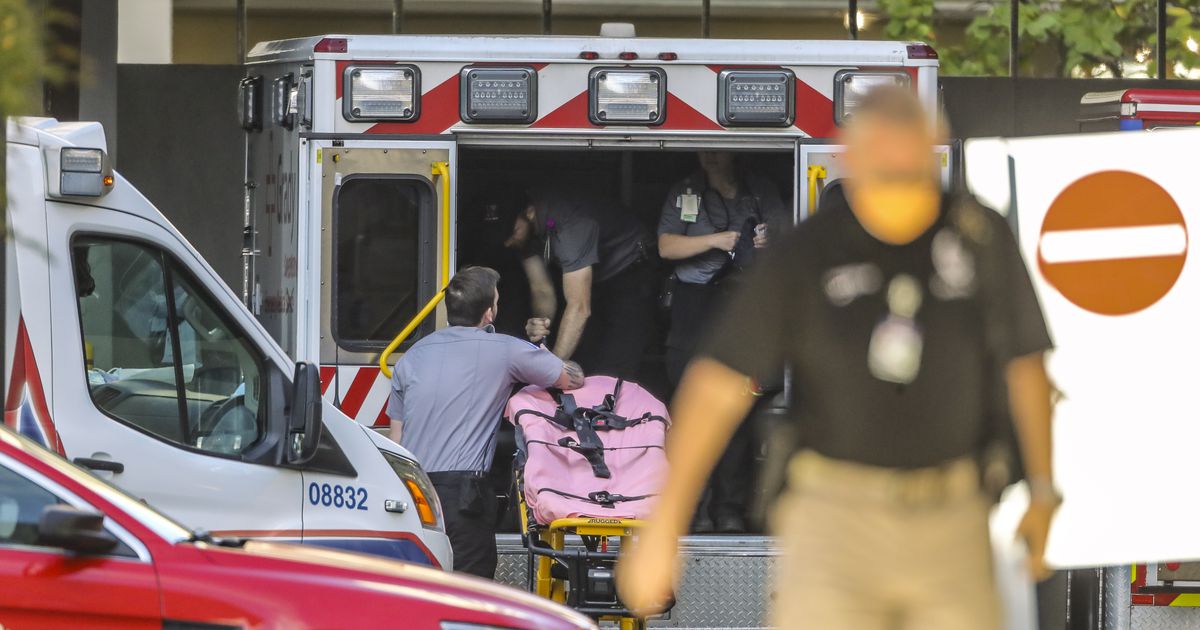
One thing that hasn’t changed since earlier this year: most patients who are hospitalized with COVID-19 are unvaccinated.
“We are seeing numbers that we never thought we’d see before, quite honestly,” said Dr. Robert Jansen, Grady Memorial Hospital’s chief medical officer. On Monday morning, Grady reported 265 COVID-19 patients, the most the downtown Atlanta hospital has reported in a single day since the start of the pandemic.
“It really is a matter of the number of people who are infected,” Jansen said. “Omicron is as infectious as anything we’ve ever seen… We have record numbers of patients who are COVID-positive who are in the ICU.”
Around the nation, 142,388 people with the virus were hospitalized on Sunday according to the U.S. Department of Health and Human Services, topping the peak of 142,315 reported on Jan. 14 of last year. In Georgia, 5,210 people were hospitalized for COVID-19 at 3:30 p.m. Tuesday, still slightly below the state’s delta wave peak that topped 6,000 at its zenith.
Hospitals report nearly as many in-patient beds in use statewide as during the delta wave as well. And in the Atlanta area, total inpatient bed use is at its high-point for all conditions.
Hospitals report some patients in this fifth wave sought care for another condition and tested positive for COVID-19 incidentally. But metro Atlanta hospital leaders say COVID-19 is putting very high numbers of patients in the hospital and in ICUs. The sickest often have underlying conditions, such as heart illness and asthma, and are brought to the brink by COVID.
Strained to begin with
When patients infected over the holidays began to arrive at hospitals at the beginning of the wave in early December, the facilities were already strained.
Hospitals were short of staff, losing their own workers to infection and quarantine, in addition to existing vacancies created when employees left earlier in the pandemic. Federal data show that staffed ICU beds in Georgia dropped by about 130 since mid-September, the peak of the delta wave. That means staff shortages make those beds unusable.
In addition, patients of all kinds had started to return to the hospital, no longer avoiding necessary care because of fear of COVID.
As a third blow, the summer’s COVID delta wave never fell all the way back down to previous lows; case numbers stalled at a higher level than expected, and patients continued to get sick.
So now, one by one, hospitals from South Georgia to Atlanta to Gainesville are reporting, yet again, too many patients for the hospital to physically hold, too many emergency room patients for staff to handle on time. According to doctors who’ve spoken to The Atlanta Journal-Constitution, patients who need to be admitted to the hospital are waiting sometimes overnight in emergency rooms. Emergency room patients are getting treated in waiting areas. Doctors treating other conditions like cancer are seeing available surgery schedule slots narrow, and some say they fear another shutdown in non-essential surgeries is coming.
The AJC learned last week that Piedmont Newton Hospital in Covington postponed some elective procedures to ensure the hospital had enough staffed beds to meet demand. The hospital system didn’t confirm it, but said any “pauses” were made at a local level.
It’s not just hospitals that are jammed. Urgent care centers and testing centers are jammed as well. Some relief is expected soon from the Georgia National Guard call-out made by Gov. Brian Kemp.
“Health systems, all the way from the pre-hospital systems to care delivered in emergency departments to care in the hospital — it is all congested now,” said Dr. Alex Isakov, a physician and Emory University professor medicine said. “If you wait in an emergency department for four, six or 10 or 12 hours, nobody wants that.”
Vaccination ‘essential’
At Northeast Georgia Health system, 81% of ICU COVID patients were unvaccinated this week. At University Hospital in Augusta, COVID-19 hospitalizations now number 117, and more than a third of those were vaccinated. But in the past ten days, the hospital’s ICU COVID-19 population has doubled to 17. Among the 11 COVID-19 patients so sick they needed to be on a ventilator, only one was vaccinated.
With children under 5 still not eligible for vaccination and vaccination rates for older children lagging, they are increasingly needing hospital care. Children’s Healthcare of Atlanta last week hit a pandemic record, with more than 100 children in beds at once for COVID-19; only 12% had been vaccinated against the virus.
Vaccination is very effective at preventing hospitalization and death. Studies performed since the variant arrived in October show two doses of the Pfizer and Moderna vaccines are not as effective at preventing infection from omicron as earlier strains, but boosters improve performance against severe disease and transmission.
“One of the most important takeaways is we are still in the thick of this pandemic,” said Dr. Gavin Harris, an assistant professor of medicine at Emory University who studies when health systems come under strain.
Vaccinating the public and getting those already vaccinated their booster shots is “essential,” Harris said, but those steps alone won’t get the country through this surge as it takes time for immunity from vaccination to take hold.
Georgians need to mask indoors and in large crowds. Widespread testing to quickly find and isolate infected people is crucial.
“It’s going to take everything to get through the next several weeks,” Harris said.
